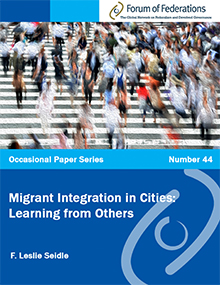Library

Language:
EnglishTopic:
Local Government - Cities and Municipalities, Minority Rights/Immigrant IntegrationCollection:
Occasional Paper SeriesAuthors:
Many countries have national migrant integration policies or programs. Many cities also have integration initiatives, whether sponsored by local government, civil society organizations or both. The programs vary considerably, and limited resources are often an obstacle. It is nevertheless clear that the level of such activity in many cities in North America and western Europe has been increasing.
Drawing on his expertise in federalism and in immigration issues, Leslie Seidle profiles five innovations in migrant integration from Canada, Germany, Spain and the United States. The four countries are either federal or—in the case of Spain—quasi-federal, allowing him to consider city-level practices within a multilevel context. The paper also includes case studies of two networks – Intercultural Cities and Welcoming America – that promote the exchange of promising practices and learning among cities.
Seidle observes that city governments are often seen as better suited than senior governments to collaborate with community partners – a widely-used approach in this sector. He shows that good ideas originate in different places and that the leadership of a highly motivated change agent is often key. With its emphasis on the potential benefits of structured interaction between residents from different backgrounds, interculturalism often underlies migrant integration initiatives in quite different urban contexts.
The Forum of Federations is sponsoring the International Metropolis Conference 2019 with this special Occasional Paper.

